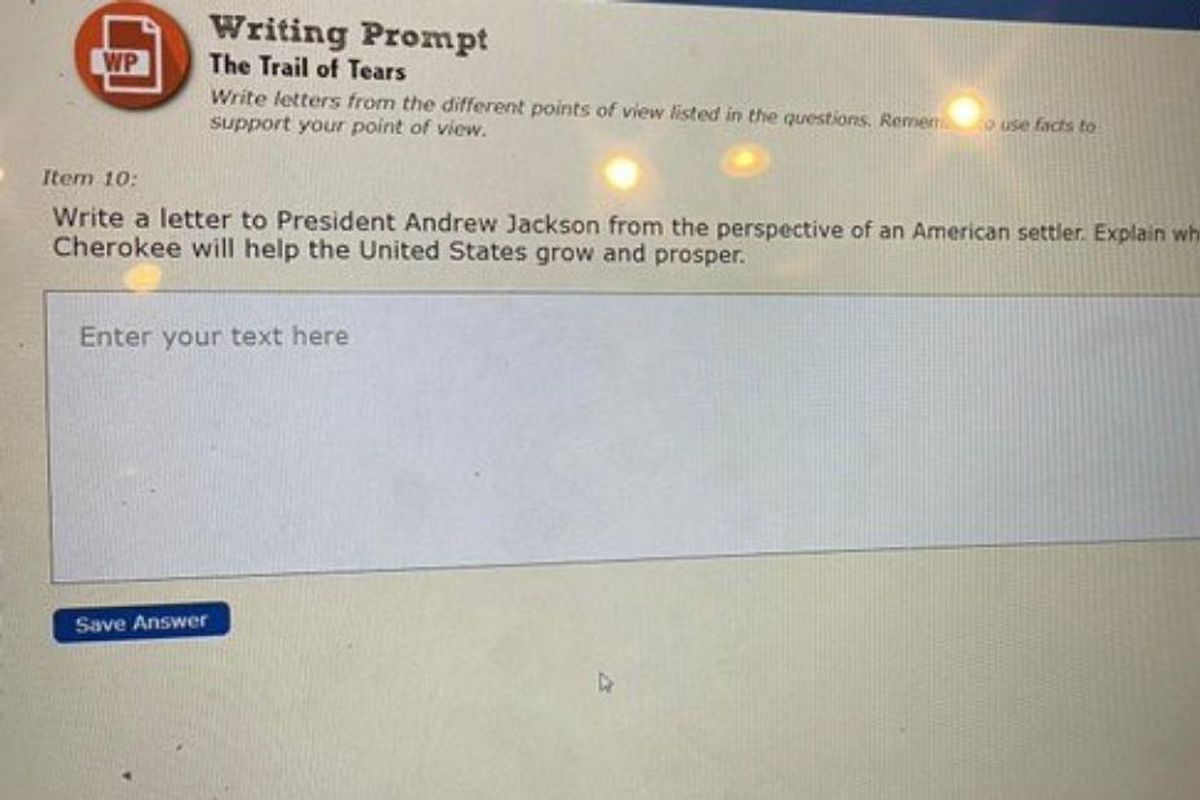Assignments that prompt students to empathize with those who committed atrocities need to go

An assignment on the Trail of Tears has prompted debate about taking historical perspectives.
Helping young people understand the causes and effects of historical events is a formidable task for any educator. History isn't just "what happened and when." There's also a "why," "how" and "who" in every historical happening, and quality history education helps students explore those questions.
Sometimes, however, that exploration can go off the rails.
Most people would agree that understanding different perspectives is an important part of learning history, but there are more and less problematic ways of helping students gain that understanding. We've seen some of the more problematic methods pop up in school assignments before, from asking students to pick cotton like slaves to listing the pros and cons of slavery.
Now an assignment from a school in Georgia is making the rounds, with people calling out issues with the perspective it asked students to take.
Jennifer C. Martin shared a photo of a computer screen from her friend's kid's school with an assignment about the Trail of Tears, telling students to write letters from the points of view listed in the questions and to use facts to support their point of view. (The Trail of Tears sometimes refers to the forced removal of several Native nations from their ancestral homelands in the Southeast in the 1830s, but also refers more specifically to the forced relocation of the Cherokee nation to Oklahoma in 1838. Thousands died of disease, exposure and starvation during the removals.)
The writing prompt on the screen reads:
"Write a letter to President Jackson from the perspective of an American settler. Explain why you think removing the Cherokee will help the United States grow and prosper."
my friend's kid's school in Georgia sent homework with this questionpic.twitter.com/pSFhJ0Ucvz— Jennifer C. Martin (@Jennifer C. Martin) 1642645127
Having written about problematic history lessons before, I know there will be people saying, "But this is just asking students to understand different perspectives! We have to be able to understand perspectives we don't agree with."
That may sound reasonable—or even desirable—but there are some problems with that line of thinking when it comes to teaching kids.
One, there's a difference between understanding someone's perspective and taking on their perspective, even as an exercise. The latter can be useful; putting yourself into someone else's shoes through "Imagine if" exercises is a good way to build empathy, helping us understand the impact of an event on a person or people. But is it desirable to build empathy with people who committed or perpetuated atrocities? I would argue it's not.
\u201cWrite a letter to Chancellor Hitler from the perspective of a German merchant. Explain why you think removing the Jews will help the Reich grow and prosper.\u201d\n\nDon\u2019t \u201cGodwin\u201d me. That\u2019s precisely what this is: Write a letter justifying genocide.https://twitter.com/notreallyjcm/status/1483987339206705152\u00a0\u2026— President Dawg (@President Dawg) 1642695467
Second, the Trail of Tears is an objectively oppressive historical event. Asking students to explain the benefits of it from the perspective of the oppressors is gross. We don't need to "both sides" an oppressive event, as if there is some legitimate justification for why it happened and what the impact was. There is an explanation, of course, but when we take on a perspective and make arguments in favor of it as a personal exercise, we risk legitimizing and justifying it. This is totally unnecessary and potentially harmful.
Third, what if you were a student whose ancestors were the ones who suffered and/or died during the Trail of Tears? How would this assignment assist in your understanding of that event? It's not like you wouldn't already know that the settlers cared more about the growth and prosperity of the United States than about your people's lives, so what would be the point of this assignment for you?
If we want students to think critically about these events and look at the different perspectives that led to the tragedy of the Trail of Tears, we can ask questions that get them to think critically without making them argue the benefits from a colonizing perspective, such as:
"Why did some American settlers support the removal of the Cherokee people? What do you think about their reasoning?"
"What were the motivations behind forcing the Cherokee people off their land? How did American settlers benefit from the tragedy?"
"Were the settlers' arguments for relocating the Cherokee aligned with the American ideals of liberty and justice? Explain."
None of those writing prompts require a student to put themselves into the mindset of people who committed or supported violent injustice, but they still accomplish the goal of understanding different perspectives and getting students to think.
We need to acknowledge that history is not neutral and history lessons are not benign. There are ways to teach history that are objectively inappropriate, no matter what the intention behind them. Asking students to take the perspective of a Nazi during the Holocaust would be inappropriate. Asking students to take the perspective of a racist white person in the South during the civil rights movement would be inappropriate. It's not appropriate to ask students to think like a colonizer during the Trail of Tears. Understanding that perspectives differ does not require taking on an oppressive perspective, even as an academic exercise, and we do students a disservice by asking them to do so.
- A mini history lesson about the concentration camps on American ... ›
- Author Neil Gaiman hands a free history lesson to those attacking ... ›
- 5 lessons from 9/11 that won't be in the history books. - Upworthy ›

